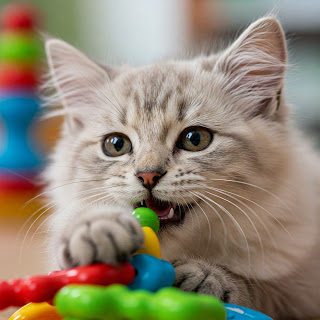Why Do Cats Bite? Unraveling the Mystery of Your Feline's Chomp!
Cats are wonderful companions, but their behavior can sometimes leave us puzzled—especially when it comes to biting. Whether it's a playful nibble or an unexpected nip, understanding why cats bite is essential for building a better relationship with your furry friend. Let’s explore the reasons behind those little bites and what you can do about them!
1. Playful Bites: Just Having Fun!
One of the most common reasons your cat might bite is simply because they’re playing. Just like kids who love to play tag, cats enjoy engaging in mock hunts, where they pounce, chase, and sometimes bite. If your cat bites during a game, it’s likely an extension of their natural hunting instincts. Kittens, especially, are still learning how to control their bites during these sessions, and your hands might become part of their play.
2. Overstimulation: A Kitty's ‘Time-Out’ Signal
It’s all fun and games until your cat gets overstimulated. While many cats love being petted or held, they have a limit. Too much attention can lead to a sudden nip or bite. This is their way of saying, "I need a break!" You may notice signs like twitching tails, flattened ears, or dilated pupils right before they bite, signaling it's time to stop and give them space.
3. Fear and Defense: The Cat's Fight-or-Flight Response
If your cat feels threatened or cornered, they may bite as a form of defense. It’s a natural instinct to protect themselves when they perceive danger, so if your cat is scared or stressed, they may react with a quick nip. To avoid defensive biting, ensure your cat has a safe, quiet space to retreat to when they feel overwhelmed or anxious.
4. Teething Kittens: The Chew Phase
Just like human babies, kittens go through a teething phase where they need to chew on things to relieve the discomfort of growing teeth. If your kitten is biting, it’s likely because their gums hurt, and they need to gnaw on something. Providing appropriate toys can help redirect their biting behavior away from your hands or furniture.
5. Instinctual Biting: The Predator Within
Cats are natural hunters, and even the most pampered house cat retains strong predatory instincts. When your cat bites, they might be simply practicing their hunting skills. This is especially true if they’re chasing toys, moving objects, or your fingers as they pretend they’re the prey. Biting is just another way they hone their predatory techniques.
6. Affectionate Bites: A Show of Love
Believe it or not, some cats bite as a form of affection. These "love bites" are typically soft and gentle, and they’re meant to express their bond with you. When a cat gives you a small nip, it’s their way of marking you as part of their territory, and they may also purr or knead you at the same time. It’s a compliment, not an attack!
7. Pain-Related Biting: A Cry for Help
If your cat has suddenly started biting more aggressively or frequently, it could be a sign of pain. Cats are notorious for hiding discomfort, so a bite might be their way of signaling something’s wrong. If your cat’s behavior changes or they seem unusually irritable, a vet visit is a good idea to rule out any health problems.
How to Handle Cat Biting
Managing biting behavior starts with understanding the cause. Here are some strategies to keep your cat’s nibbles under control:
- Provide Plenty of Play: Offer toys and engage in interactive play to keep them entertained.
- Respect Their Limits: Learn the signs of overstimulation and stop petting before it leads to a bite.
- Create a Calm Environment: Minimize stressful situations, and allow your cat to retreat to a safe space when needed.
Understanding the "why" behind your cat’s biting behavior will help you respond appropriately. Whether they’re playing, feeling overstimulated, or just showing affection, knowing the root cause will lead to a better relationship with your feline friend. Remember, each bite comes with a message—pay attention, and you'll know exactly how to react!










